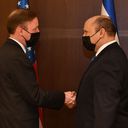Jake Sullivan laid out three Iran deal scenarios in Israel meetings

Four senior Israeli officials who attended meetings in Jerusalem with national security adviser Jake Sullivan tell Axios they came away reassured that the U.S. is ready to take a harder line on Iran if necessary and to take Israel’s views into account.
The big picture: Sullivan sketched out three possible near-term scenarios on Iran’s nuclear program in the meetings, two officials say:
- An agreement within the next several weeks to return to full compliance with the 2015 deal, which he was skeptical would be achieved.
- A “freeze for freeze” interim agreement to stop Iran from further accelerating its program.
- No deal and new sanctions and pressure on Iran.
The backstory: As the nuclear talks resumed in Vienna, anxiety was growing in the Prime Minister’s Office over the idea that the Biden administration would seek a partial agreement that would provide Iran with sanctions relief without any nuclear rollback.
- The idea of a possible “freeze for freeze” agreement was discussed during Sullivan’s meetings with Prime Minister Naftali Bennett, Foreign Minister Yair Lapid and Defense Minister Benny Gantz, all three of whom told Sullivan they oppose such a step, Israeli officials say.
- Such a deal could prevent Iran from enriching uranium to weapons-grade levels. But Lapid told Sullivan that Israel already operates as though Iran has 90% enriched uranium, “and we don’t think there is any need to pay them not to do it,” according to one Israeli official.
- Sullivan met Bennett, Lapid and Gantz on Wednesday following a meeting on Tuesday with President Isaac Herzog.
What they’re saying: One senior Israeli official told me Bennett appreciated the fact that Sullivan made the trip despite the many other pressing issues the Biden administration is facing, and saw it as a signal that the White House is attentive to Israel’s concerns. The official added that the meeting was very substantive and could have bearing on both countries’ policies.
- “For the first time, both sides really understood each other. Over time, there was ripening on both sides and we feel a bit more reassured after today,” the senior official said.
- Another senior Israeli official concluded after meeting with Sullivan that the Biden administration “is in a better place than we thought” on Iran, and the policy gaps are smaller than previously believed.
- Sullivan told Bennett at the top of their meeting that President Biden sent him to Jerusalem on Christmas week because he thought it was important “to sit together and develop a common strategy, a common outlook” on Iran and find a way forward that secures the interests of both U.S. and Israel.
- Sullivan also led a meeting of a U.S.-Israel working group on Iran Wednesday along with his Israeli counterpart, Eyal Hulata. They discussed "the need to confront all aspects of the threat posed by Iran, including its nuclear program, destabilizing activities in the region, and support for terrorist proxy groups," according to a White House statement.
Behind the scenes: Two Israeli officials who attended the meetings told me Sullivan made it clear that the window for further talks in Vienna could close by the end of January or the beginning of February.
- Sullivan expressed skepticism about the chances of reaching a full agreement by then, the officials said.
- Bennett, Lapid and Gantz, meanwhile, argued that an interim agreement would offer a lifeline to the Iranian economy, with some of that money flowing to Iranian proxies that threaten Israel.
- The Iranians have also rejected the idea of an interim agreement that does not provide full relief from U.S. sanctions, and they contend that they’re negotiating in good faith for a return to the 2015 deal despite U.S. suspicions that they’re only playing for time.